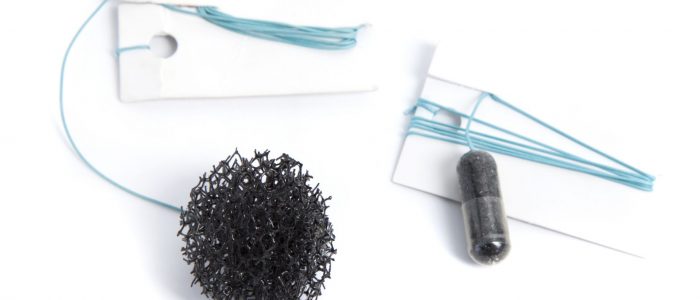New ‘Sponge’ Endoscopy Could Replace Traditional Tests to Help Identify Cancer
Swallowing a small sponge on a string could replace traditional endoscopy tests as an equally effective but faster and less invasive way of diagnosing cancer at early stage for patients at risk of developing oesophageal cancer.
NHS Forth Valley is set to take part in a national trial using the Cytosponge which is wrapped in a coated pill so that it can easily be ingested with a glass of water. The innovative new procedure has the potential to become a game changer, removing the need for an anaesthetic and can be completed in just minutes.
Around 25 per cent of patients with gastric reflux who require an endoscopy may be eligible for the new procedure.
The Cytosponge is a single-use first line diagnostic device which collects cells from the lining of the oesophagus. It consists of a small mesh sponge, about 30 mm in diameter, encased in a pill and attached to a string. The patient swallows the capsule and the pill’s coating dissolves once the Cytosponge reaches the stomach. It then expands into a small, rough textured sponge.
After approximately five minutes, healthcare staff can retrieve the expanded sponge using the string which collects some of the cells lining the food pipe which it is removed. These are then sent off for analysis to detect whether or not there is a biomarker that indicates Barrett’s Oesophagus.
Barrett’s Oesophagus is caused by acid coming back up the food pipe from the stomach – known as acid reflux – which can cause symptoms like indigestion and heartburn.
Over time people with these symptoms may develop changes in the cells that line the oesophagus. These cells can become cancerous and so patients with Barrett’s Oesophagus are tested every couple of years.
Barrett’s Oesophagus is usually diagnosed by having a biopsy during an endoscopy. This can be uncomfortable and carries some risks – and it’s not always practical for everyone who has symptoms like reflux and heartburn.
NHS Forth Valley’s Deputy Medical Director for Acute Services, Juliette Murray, explained: We are really excited to be taking part in this important new national trial. Not only is this simple procedure much more comfortable for the patient, as it only takes minutes to complete, we will be able to carry out more of these procedures at each clinic.
“Early diagnosis of oesophageal cancer is vital to improve survival rates and patients can also benefit from less severe treatment options if their cancer is caught at an earlier stage.”
Additional Information
Oesophageal cancer is the thirteenth most common cancer in the UK. Around 5,600 men develop the disease each year compared with 2,750 women. And each year around 5,200 men and 2,460 women die from the disease.
Unlike endoscopy procedures, where a long, thin, flexible tube with a light and camera at one end is inserted to inspect organs inside the body, Cytosponge is a non-Aerosol Generating Procedure (AGP) and can be performed outside of traditional hospital environments, such as community health centres or general outpatient clinics.
Cytosponge is part of an accelerated roll-out of innovative technologies across NHS Scotland to support the resumption of health services that had to be paused because of the Covid-19 pandemic.





